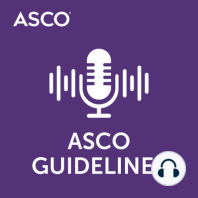15 min listen

Management and Care of Patients with Invasive Cervical Cancer: Resource-Stratified Guideline Rapid Recommendation Update
FromASCO Guidelines
Management and Care of Patients with Invasive Cervical Cancer: Resource-Stratified Guideline Rapid Recommendation Update
FromASCO Guidelines
ratings:
Length:
7 minutes
Released:
Mar 7, 2022
Format:
Podcast episode
Description
An interview with Dr. Linus Chuang from Danbury Hospital and Norwalk Hospital, Nuvance Health in Connecticut and New York, co-chair on “Management and Care of Patients with Invasive Cervical Cancer: ASCO Resource-Stratified Guideline Rapid Recommendation Update.” Dr. Chuang discusses the updated recommendation on the use of pembrolizumab in patients with persistent, recurrent, or metastatic cervical carcinoma, based on the results from the KEYNOTE-826 study. For more information, visit, www.asco.org/resource-stratified-guidelines. Transcript BRITTANY HARVEY: Hello, and welcome to the ASCO Guidelines podcast series brought to you by the ASCO Podcast Network, a collection of nine programs covering a range of educational and scientific content and offering enriching insight into the world of cancer care. You can find all the shows, including this one, at asco.org/podcasts. My name is Brittany Harvey, and today I'm interviewing Dr. Linus Chuang from Danbury Hospital in Norwalk Hospital, Nuvance Health, in Connecticut and New York, Co-Chair on "Management and Care of Patients with Invasive Cervical Cancer-- ASCO Resource-Stratified Guideline Rapid Recommendation Update." Thank you for being here, Dr. Chuang. LINUS CHUANG: Thank you for having me. BRITTANY HARVEY: First, I'd like to note that ASCO takes great care in the development of its guidelines and ensuring that the ASCO conflict of interest policy is followed for each guideline. The full conflict of interest information for this guideline is available online with a publication in the Journal of Clinical Oncology Global Oncology. Dr. Chuang, do you have any relevant disclosures that are directly related to this guideline topic? LINUS CHUANG: No, Brittany. BRITTANY HARVEY: Thank you. Then talking about the content of this publication, so what prompted this rapid update to the "Management and Care of Patients with Invasive Cervical Cancer-- ASCO Resource-Stratified Clinical Practice Guideline," last published in 2016? LINUS CHUANG: ASCO Rapid Recommendations Updates highlight revisions to ASCO guideline recommendations on "Management and Care of Women with Invasive Cervical Cancer, the ASCO Resource-Stratified Clinical Practice Guideline" that was published in September of 2016. We revised the guidelines to reflect new and practice-changing data on the use of pembrolizumab combination therapy in patients with metastatic, recurrent, or persistent cervical cancer in enhanced and maximal settings. BRITTANY HARVEY: Great. Then based off this new data for the pembrolizumab combination therapy, what are the updated recommendations from the guideline panel? LINUS CHUANG: Based on this recently published report about the KEYNOTE-826 study, the checkpoint inhibitor pembrolizumab alongside standard chemotherapy with or without bevacizumab as first-line therapy significantly improved the overall and progression-free survival in patients with persistent, recurrent, or metastatic PD-L1 expressing cervical cancer. BRITTANY HARVEY: Great. Thank you for providing that recommendation. So what should clinicians know as they implement these recommendations, and for which settings do these recommendations apply? LINUS CHUANG: This trial included 617 patients, pembrolizumab 200 milligrams delivered intravenously every three weeks in combination with standard chemotherapy and with or without bevacizumab for up to 35 cycles. It's worth emphasizing based on the following study results the median progression-free survival was 2.2 months longer in the pembrolizumab group that have a PD-L1 combined positive score of 1 or more. And the progression-free survival at 12 months was also longer by 20% in the pembrolizumab group when compared to the placebo group. The overall survival rate at 12 and 24 months were higher in the pembrolizumab group-- 75% and 53% respectively-- compared with the placebo cohort-- 63% and 41% respectively. According to the study, the most common adverse reactions, which occur in mor
Released:
Mar 7, 2022
Format:
Podcast episode
Titles in the series (100)
Patient-Clinician Communication Consensus Guideline: An interview with Dr. Timothy Gilligan from Taussig Cancer Institute and Institute and the Center for Excellence in Healthcare Communication, Cleveland Clinic, Cleveland, OH on the guideline providing guidance to oncology clinicians on how... by ASCO Guidelines